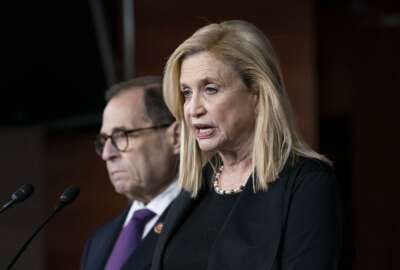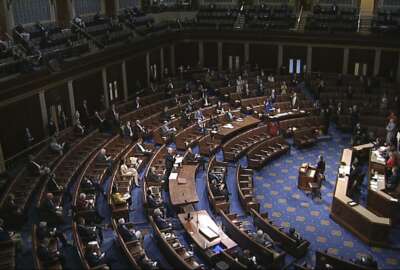
$3T House coronavirus package would require telework, grant premium pay to federal employees
Under the Heroes Act, the $3 trillion coronavirus relief package House Democrats unveiled Tuesday, eligible federal employees would keep teleworking through the end...
The $3 trillion coronavirus legislative package House Democrats unveiled Tuesday afternoon is chock-full of new provisions that could impact federal employees — including new telework requirements and hazard pay for those working on the frontlines of the government’s pandemic response.
The House is expected to return Friday to Capitol Hill to vote on the legislative package, called the Heroes Act, but it’s unclear if the bill will go much farther than that.
Senate Majority Leader Mitch McConnell (R-Ky.) quickly dismissed the House proposal, calling it “aspirational.”
“This is nothing more than a messaging exercise by House Democrats,” Sen. John Thune (R-S.D.) told reporters Tuesday. “It’s not going anywhere, and we all know that.”
Regardless, the Heroes Act makes good on several standalone proposals House and Senate Democrats have offered up in recent weeks, all of which could impact the way federal employees are compensated and could change their working environments during the pandemic.
Telework requirements
First, the HEROES Act explicitly requires telework for all federal employees who are eligible — at least through the end of 2020.
The bill requires agencies to set specific goals to increase the number of employees who regularly and periodically telework.
Agencies who plan to reduce or limit telework among their employees must give advanced notice to the Office of Personnel Management and Congress, according to the bill.
In addition, the legislation prohibits agencies from issuing broad limitations on telework participation. Several agencies, including the Agriculture Department and the Education Department, had cut the number of days employees could telework to one day a week before the pandemic.
The Heroes Act also instructs OPM and the Chief Human Capital Officers to develop and set uniform guidance detailing how agencies should collect data on and report the cost savings of telework.
Telework reporting varies widely across the federal workforce today, and many agencies don’t have the systems they need to report certain metrics.
Pandemic premium pay fund would include feds
The House legislation would establish a new “COVID-19 Heroes Fund,” which Congress would use to pay essential frontline employees working in regular contact with others during the coronavirus pandemic.
Federal employees whose positions require them to have regular contact with the public or whose jobs require them to report for duty where social distancing isn’t possible, would be eligible for pandemic premium pay — on top of their regular salaries and any other premium bonuses they might be receiving today.
Payments would be capped at $10,000 for all essential employees, though certain federal employees could see some additional limitations.
“Pandemic premium pay is in addition to other premium pay that may be available for federal employees, except that aggregate pay may not exceed the annual rate of pay available in any calendar year for level II of the Executive Schedule,” according to the 71-page summary of the Heroes Act House Democrats released Tuesday afternoon.
For 2020, level 2 of the Executive Schedule is capped at $197,300, meaning total salaries, premium pay and pandemic bonuses would be capped at that amount.
Read more Workforce news
According to the legislation, essential employees would receive pandemic premium pay for any work done from Jan. 27, 2020 until 60 days after the end of the coronavirus crisis.
Teleworking federal employees would not be eligible for pandemic premium payments, according to the Heroes Act.
To cover the costs of pandemic premium payments for federal employees, Congress would appropriate an additional $10 billion to agencies.
Senate Democrats in April proposed a similar arrangement for essential frontline workers, which also included federal employees. But under their proposal, pandemic premium payments were worth up to $25,000 a year.
Health flexibilities and worker’s compensation
Additional provisions in the Heroes Act mirror other standalone bills House Democrats have introduced in recent weeks.
One provision, for example, would create a new presumption for federal employees whose duties require significant contact with the public. Employees who fit into this category and contract coronavirus would receive worker’s compensation, according to the Heroes Act.
The legislation would also allow federal law enforcement officers and first responders to keep their existing retirement plans if they contract coronavirus, are unable to meet the physical demands of their jobs and are subsequently moved to other jobs within the civil service as a result.
By law, many federal law enforcement officers are required to retire by age 56, and these employees usually receive a supplemental annuity until they’re eligible for Social Security benefits.
In addition, the Heroes Act would cover coronavirus treatment with no cost sharing for participants in the Federal Employee Health Benefits Program (FEHBP).
The same provisions would apply to veterans and TRICARE participants.
Copyright © 2024 Federal News Network. All rights reserved. This website is not intended for users located within the European Economic Area.
Nicole Ogrysko is a reporter for Federal News Network focusing on the federal workforce and federal pay and benefits.
Follow @nogryskoWFED






